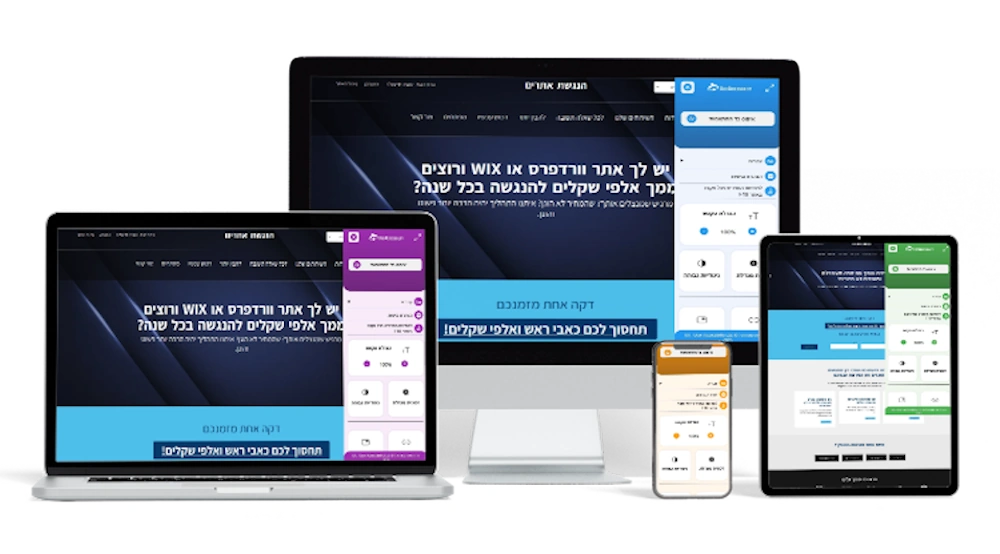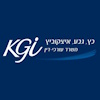
דקה אחת מזמנכם
תחסוך לכם כאבי ראש ואלפי שקלים!
השאירו פרטים ונחזור אליכם מיד
הנגשה אמיתית לפי דרישות החוק
הנגשה לפי
התקן
התקנות והתקנים הם למעשה התנך שלנו ועל פיהם אנחנו עובדים ומנגישים את האתר שלכם.
התאמות
ידניות
כל אתר שונה ולכן לכל אתר נדרש קוד אחר. כחלק מהתליך העבודה שלנו אנחנו כותבים קוד שמותאם לאתר עליו אנחנו עובדים.
בדיקות עם
טכ' מסייעות
אנחנו מבצעים בדיקות ידניות, אוטומטיות וגם עם תוכנות קוראות מסך ושימוש במקלדת בלבד.
אישור
נגישות
אישור מטעם החברה על ביצוע העבודה בהתאם לתקנות ולפי דרישות הנציבות לשיוון זכויות עבור אנשים עם מוגבלות
עזרה בכתיבת
הצהרת נגישות
הצהרת נגישות היא מקור לתביעות משפטיות וחשוב לנו שלא תגיעו למצב שבו תובעים אותכם בשביל עבודה של כמה רגעים. אנחנו נסייע לכם איך לכתוב ומה.
ניתור
ובקרה
חלק מהפעילות התוסף שלנו הוא לבדוק כל עמוד שבו הגולשים נכנסים אליו ולוודא שההנגשה נשמרת גם לאחר שינויים באתר שלכם. אם ישנם ליקויים היא מתריעה לנו.
תחזוקה
קבועה
כאשר מערכת הניתור והבקרה שלנו מזהה בעיה היא פותחת פניה אוטומטית למערכת שלנו ואנחנו מתקנים אותה ללא עלות כחלק מהשירות לאתר לאורך כל השנה.
תמיכה בפניות
בנושא נגישות
לעיתים כאשר יש שאלות או פניות בנושא נגישות צריך להתייעץ עם מומחים שיודעים איך אנשים עם מוגבלות גולשים וכיצד ניתן לסייע להם במידת הצורך
בחר את התוכנית שמתאימה לך
|
בחר חבילה
|
הנגשת שנתית
₪708.00 /לשנה (כולל מע"מ)
|
הנגשה חד פעמית
₪1,593.00 / חד פעמי (כולל מע"מ)
|
|---|---|---|
| מחיר ללא מע״מ | ₪600.00 | ₪1,350.00 |
| אופן התשלום | מתחדש בכל שנה | תשלום חד פעמי |
| דומיין או סאב דומיין יחיד חבילה זו מתייחסת לדומיין אחד בלבד או לתת־דומיין אחד (subdomain). לדוגמה: example.co.il או shop.example.co.il נחשבים כל אחד כיחידה נפרדת. | ||
| לפי תקן 5568 ו- WCAG 2.0 ברמה AA התקנות והתקנים הם למעשה התנך שלנו ועל פיהם אנחנו עובדים ומנגישים את האתר שלכם. | ||
| התאמות ידניות כל אתר שונה ולכן לכל אתר נדרש קוד אחר. כחלק מהתליך העבודה שלנו אנחנו כותבים קוד שמותאם לאתר עליו אנחנו עובדים. | ||
| בדיקות עם טכ' מסייעות אנחנו מבצעים בדיקות ידניות, אוטומטיות וגם עם תוכנות קוראות מסך ושימוש במקלדת בלבד. | ||
| אישור נגישות אישור מטעם החברה על ביצוע העבודה בהתאם לתקנות ולפי דרישות הנציבות לשיוון זכויות עבור אנשים עם מוגבלות | ||
| עזרה בהצהרת נגישות הצהרת נגישות היא מקור לתביעות משפטיות וחשוב לנו שלא תגיעו למצב שבו תובעים אותכם בשביל עבודה של כמה רגעים. אנחנו נסייע לכם איך לכתוב ומה. | ||
| ניתור ובקרה חלק מהפעילות התוסף שלנו הוא לבדוק כל עמוד שבו הגולשים נכנסים אליו ולוודא שההנגשה נשמרת גם לאחר שינויים באתר שלכם. אם ישנם ליקויים היא מתריעה לנו. | ||
| תחזוקה קבועה כאשר מערכת הניתור והבקרה שלנו מזהה בעיה היא פותחת פניה אוטומטית למערכת שלנו ואנחנו מתקנים אותה ללא עלות כחלק מהשירות לאתר לאורך כל השנה. | ||
| תמיכה בפניות בנושא נגישות לעיתים כאשר יש שאלות או פניות בנושא נגישות צריך להתייעץ עם מומחים שיודעים איך אנשים עם מוגבלות גולשים וכיצד ניתן לסייע להם במידת הצורך | ||
| כולל הנגשת שינויים באתר כאשר יש שינויים משמעותיים באתר כמו הוספת אזור חדש או שינוי עיצובי לאזור קיים אנחנו נבצע את ההנגשה מחדש ללא עלות נוספת. | ||
| כולל הנגשה מחדש בעת שידרוג האתר כאשר משדרגים את כל האתר מחדש צריך לבצע הנגשה מחדש אנחנו נבצע את ההנגשה מחדש ללא עלות נוספת. כל מה שאתם צריכים לעשות הוא להודיע לנו | ||
| הטבה סודית לרוכשים און ליין בלבד הטבה סודית לרוכשים חבילת תחזוקה ודרך האתר בלבד. ההטבה אינה תקפה למי שרוכש באפיקים אחרים | ||
|
לרכישה! |
לרכישה! |
אנחנו יודעים מה עורכי דין מחפשים
וסוגרים את הפירצות עבורכם
באמצעות הידע והניסיון שלנו, אנו מסייעים לכם להמנע מחשיפה לתביעות ולהבטיח שהאתר שלכם יהיה נגיש בהתאם לתקנות.
מחפשים אתרים שהונגשו חלקית או אוטומטית
הנגשה אוטומטית או חלקית אינה עומדת בדרישות התקן ולמעשה חושפת אותכם לתביעות יצוגיות
הם מחפשים מידע חסר בהצהרת נגישות
נוסח של הצהרת נגישות שאינו מלא מאפשר על פי התקנות לתבוע אותכם מיד
פניות של אנשים עם מוגבלות שלא טופלו נכון
אנשים יפנו אליכם עם בעיות או קשיי נגישות באתר וחשוב מאוד שתטפלו מיד ועם הדרכה נכונה

בזכות תהליכים ושיטות עבודה שפתחנו
הצלחנו לייעל את תהליך ההנגשה ולהפוך אותו למהיר, מדויק וידידותי יותר ללקוח. כל שלב בתהליך מגובה בידע מקצועי וניסיון שטח רחב, עם הקפדה על עמידה בתקני הנגישות המחמירים ביותר. השיטה שלנו מאפשרת התאמה אישית לצרכי כל אתר תוך שמירה על איכות בלתי מתפשרת.
התאמה למותג שלכם
התפריט שלנו משקף את המותג שלכם לפרטי פרטים צבעים, סגנון, איקונים ומיקום – כל אלמנט מעוצב בקפידה בהתאם לחזון שלכם. אנחנו לא מסתפקים בתוסף נגישות אלא חשוב לנו מאוד לצור חוויה ויזואלית עשירה ומקיפה שמדברת בדיוק בשפה העיצובית של המותג שלכם.

בהפרש שתחסכו בנינו לאחרים צאו לחופשה במלון !
איפה אתם נמצאים בתהליך?
הלקוחות שלנו אומרים הכל
מה לא מספרים לכם על הנגשת אתרים?
בעוד שחברות רבות מציגות את הנגשה כדבר מסובך ויקר – אנחנו כאן כדי לחשוף את האמת:
היום, אתרים רבים כבר מגיעים נגישים מהקופסה.
כשהעולם כולו דורש נגישות דיגיטלית, מפתחי תוספים ותבניות בונים מראש רכיבים שעומדים בתקני נגישות. גלריות, תפריטים, כפתורים – הרבה מהם כבר מותאמים. אז למה לשלם כאילו הכל צריך להיבנות מחדש?
נכון, עדיין יש התאמות שצריך לבצע, בדיקות שצריך לערוך ושיפורים שחשוב ליישם – אבל זה בדיוק המקום שבו אנחנו חוסכים לכם כסף.
בזכות הגישה שלנו, שבה אנחנו מתמקדים רק במה שצריך באמת להנגיש הלקוחות שלנו חסכו כבר מעל 2,366,100 ש"ח בהוצאות הנגשה מיותרות.
אנחנו מאמינים שבעולם דיגיטלי מתקדם, גם המחיר של הנגשה צריך להיות הגיוני, שקוף, וכזה שכל בעל עסק יכול להרשות לעצמו.





























